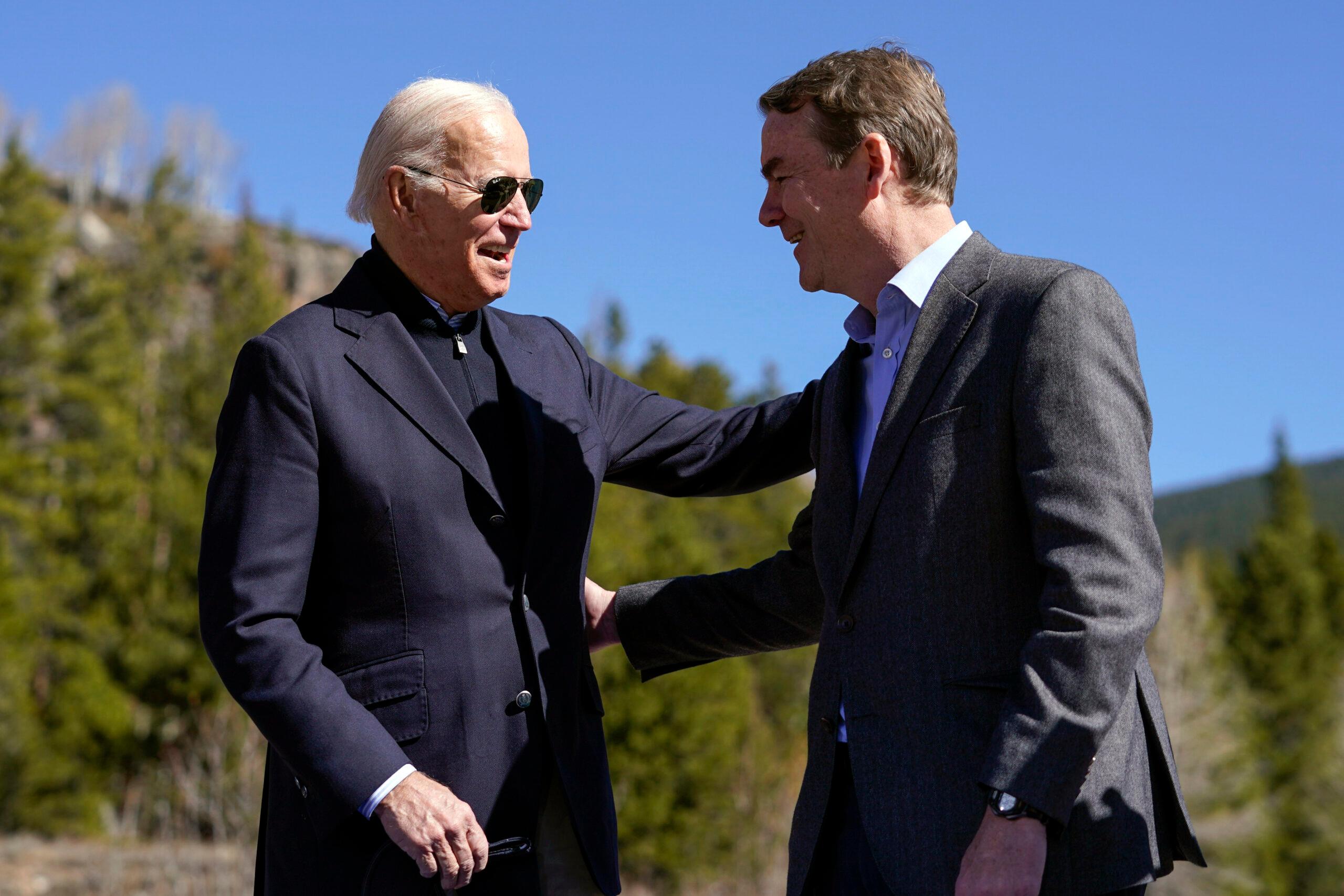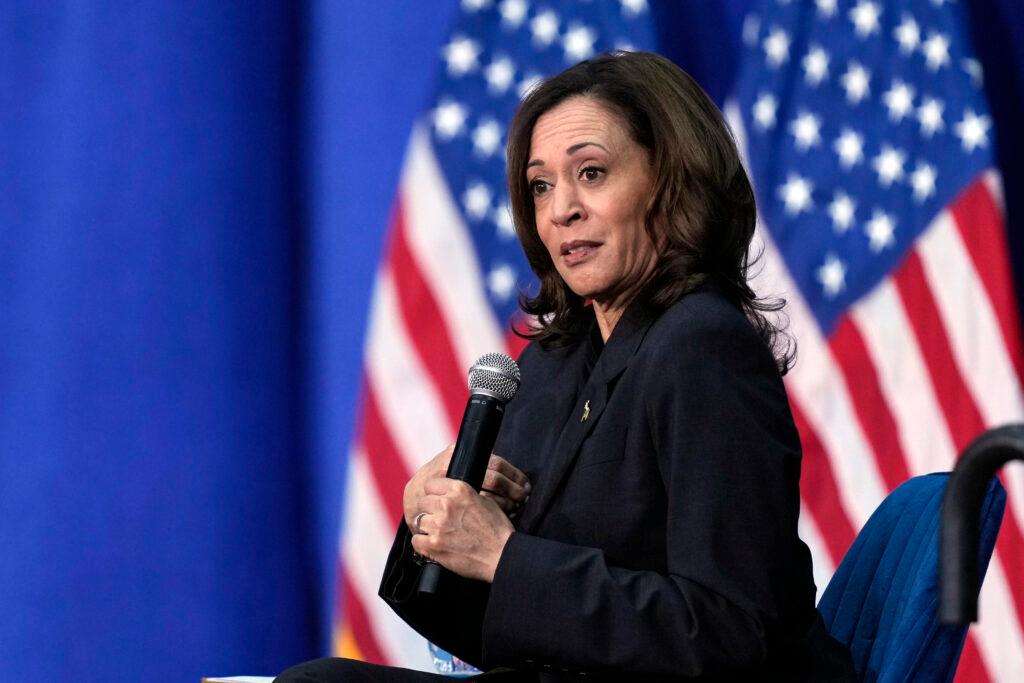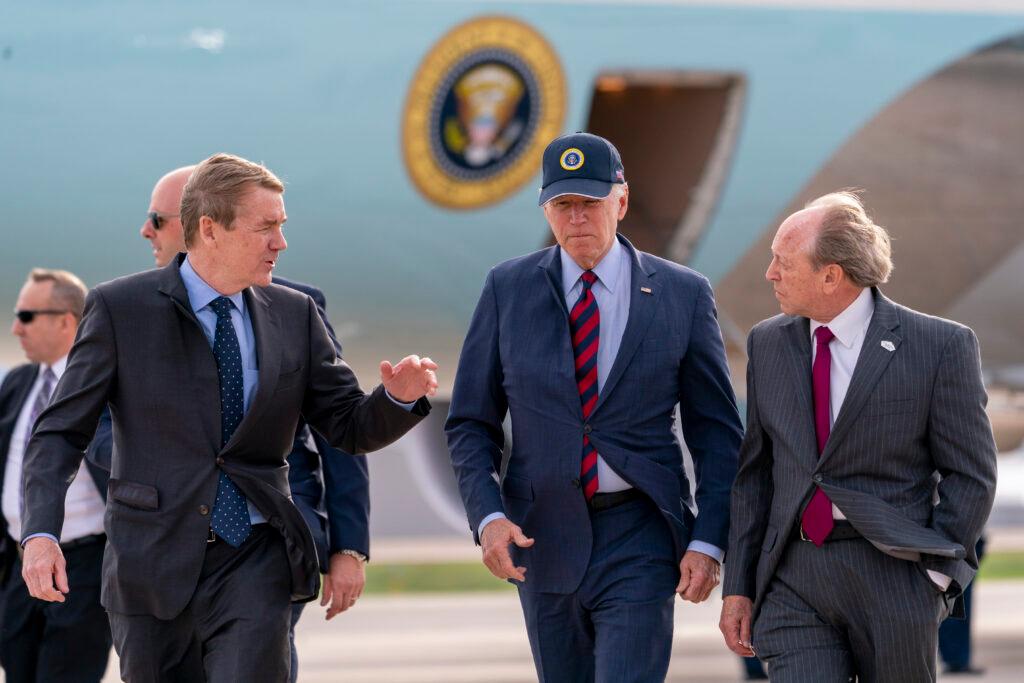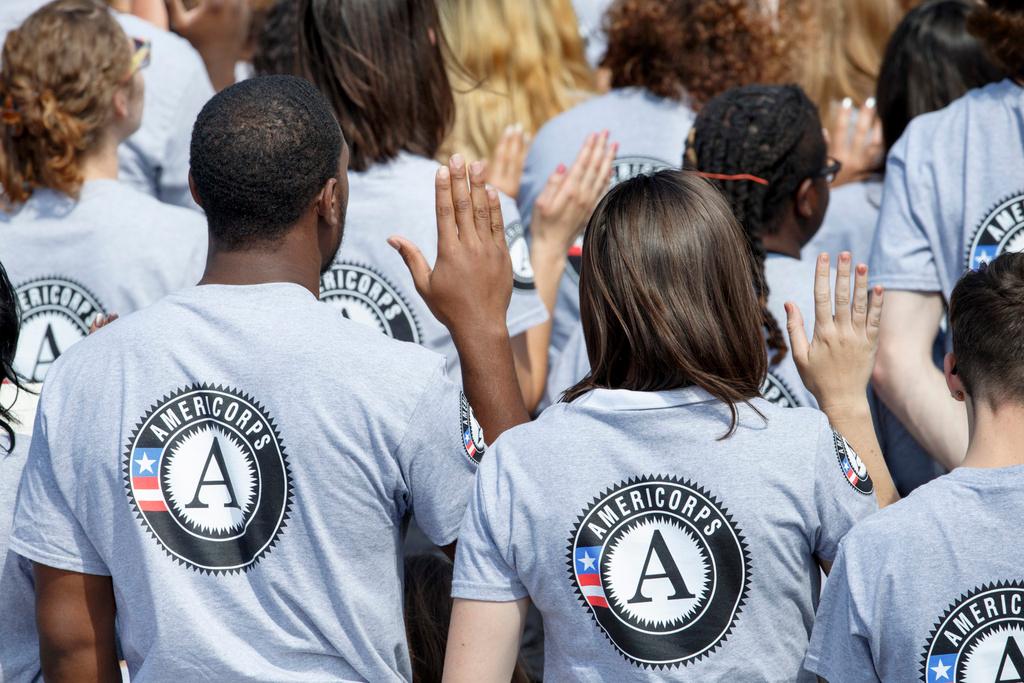
One of Colorado’s top elected Democrats says of the upcoming election that he feels “much better about it today than I did yesterday” following President Joe Biden’s decision to drop out of the race for the White House.
U.S. Sen. Michael Bennet was among the first Democrats to sound the alarm after a poor debate performance against Donald Trump. At the time, he told congressional colleagues — and later national news outlets — that Democrats could be headed for grave losses up and down the ballot. In a conversation with Colorado Matters on Monday, he told Ryan Warner his outlook had brightened.
“I think our odds are much better now than they were before,” Bennet said. “I was worried before that we were going to face a landslide loss, not just of the presidency, but of the Senate and of the House,” Bennet said.
Bennet said there were indications Biden had declined, but that the June 27 debate in Atlanta led him to talk openly about Biden’s chances.
“The debate surprised a lot of us. I was certainly surprised by the debate, and not just by the debate, but by the 11 days and the 12 days after the debate in which I think the White House did not acquit itself very well in the aftermath of the debate,” Bennet said.
Bennet discussed the president’s decision and whether his name is in the pool for possible vice presidents.
This interview has been edited for length and clarity
Warner: Two weeks ago, you told members of Congress and later CNN, you didn't believe Biden could win and you felt Democrats could be headed for landslide losses. How are you feeling now?
Bennet: Well, I feel incredibly grateful to Joe Biden. One of the things that I said to his people when they came to meet with the Democratic caucus in the Senate was that those of us that were suggesting that he decide not to run, were asking him to do something that had really never been done in American history. We were asking him to sacrifice something that no one in their right mind would ever sacrifice, which is the power of the White House, or any sort of power like that. And in asking them to do something that we would never ourselves be confronted with, we were asking them to really stretch their imaginations for the benefit of the American people and to stretch their historic — including the president’s in particular —historic commitment to public service in making this decision. And so mostly what I feel is a huge debt of gratitude to the President for making that difficult a decision in the public's interest. That's something that's seldom done by politicians, and I think it's important to recognize it.

Warner: You have endorsed the Vice President, so how are you feeling about Democrats' odds now?
Bennet: I think our odds are much better now than they were before. I was worried before that we were going to face a landslide loss, not just of the presidency, but of the Senate and of the House. As you know today, the Democrats have barely a one vote majority in the Senate. We're behind in the House, and I think our odds are better. I mean, this is not going to be easy. This is going to be a hard election. It's a very close election. Donald Trump is ahead in the swing states that we have to win in this election, but I feel much better about it today than I did yesterday.
Warner: 477,000 Coloradans cast a primary ballot for Joe Biden. Was this decision driven by Democratic party elites, as some have suggested?
Bennet: I don't think so. I do think that people who say, look, 477,000 people voted for Joe Biden and many more than that, millions voted for him across the primaries. And that making a decision that's different from the decision they made has a risk of being undemocratic. I actually understand what people are saying when they say that, and in a sense it's true. In a sense it's true because these millions of people did vote for Joe Biden. But I think the answer to that is, there are changed circumstances because it became clear that he wouldn't be able to succeed. And in the end, he's the one that made that judgment. He's the one that's made that judgment.
Nobody else could have made that judgment for him. Nobody else could have said to his delegates as he has now said, you should vote for somebody else. So I think that's not just an answer for that. I think that's the truth of the matter.
Warner: Did Democrats, and I'm asking specifically, did you as a Democrat hide President Biden's decline from the American people? Why did it take a televised debate to get this rolling?
Bennet: Well, I certainly didn't, as a Democrat, hide the President's condition from the American people. I think that I was one of the earliest, if not the earliest person, to say that I thought that we were going to have to make a change.
Warner: But that was after it was on display on camera.
Bennet: Yeah, because of the debate. But the debate surprised a lot of us. I was certainly surprised by the debate, and not just by the debate, but by the 11 days and the 12 days after the debate in which I think the White House did not acquit itself very well in the aftermath of the debate.
Warner: I just want to say, you were surprised by the debate? That was a different Joe Biden than you'd seen. I mean, how recently had you seen him?
Bennet: I had seen him some weeks before at the White House at an immigration-related event, and I had some worries then about whether or not he seemed frailer to me. He was giving a forceful speech, he was reading from a teleprompter, but he did seem frailer to me at that event.
I had not had any anticipation that we would see what we had seen at the debate. Look, I think that the President has made an unbelievably difficult decision. I think that he's made a huge contribution to our country in making that decision. And I think Democrats have demonstrated that we are not a cult-of-personality party. We have been able to adjust our offering going into this election in ways that have contended with the truth of the matter, with respect to the president's ability to be able to win this election. And that stands, I think, in stark contrast to the way the Republicans have succumbed to Donald Trump's mistruths and lies.
Warner: We heard from a Republican on the Western slope, a state representative by the name of Matt Soper, who thinks that Kamala Harris's California-ness is not going to set well with Coloradans, some of whom are famously antagonistic towards California. Do you think her California-ness is a disadvantage nationally? In Colorado specifically? And might it be tempered by some running mate pick?
Bennet: I don't think that we have a bias against Californians in Colorado. I think we turn Californians into Coloradans and just like everybody else who moves to our state, it's one of the things I always love about Colorado is that whenever you arrive here, it turns out that you've been here longer than somebody else has been here. I think that she is going to have to demonstrate in these Midwestern swing states, Wisconsin and Michigan and Pennsylvania, that she has the entire interest of the United States at heart and especially working people in those states at heart, and that she and the Democratic Party can deliver something better than Donald Trump's trickle-down economics, which is what he pursued when he was president of the United States.
Warner: And what do you think about a running mate as adding to that picture?
Bennet: I think that it would be good if we could find a running mate who could help her win one of those swing states if it were possible to find somebody who could take one of those states off the table and then it became two states instead of three states that she has to win. But sometimes it's difficult to make calculations about who that might be because you're seldom a prophet in your own land. And politicians that look popular nationally are sometimes not the best people to be able flip a certain state or another state. So she's got a hard decision to make ahead of her.
Warner: You're not raising your hand and furiously waving it in the air for Veep. I'll just note that you ran for president.
Bennet: Well, I appreciate your observing that I ran for president. Not many people noticed that. Even my mom asked me, ‘Michael, do we really need one more person in this race’ when I got in the race.
But Vice President Harris and I got to know each other really during that race. I mean, she also didn't have a great race either, but you learn a lot about the country. You learn a lot about yourself just as you do when you're running for office in Colorado.
Warner: But it sounds like you think her pick should not be you.
Bennet: I think she'll have many people that she'll consider before she gets to me. If she ever wanted to have a conversation, she certainly knows how to find me.

Warner: You reflected on her relatively short-lived presidential campaign. Does that bode poorly for this one?
Bennet: I think that it may be John Hickenlooper who said this — and I want to apologize to him in advance if he didn't actually say this — but I think he once said to me that the candidate who grows the most in a race tends to be the candidate who wins. And I believe that. I really believe that. I've seen that at local races. I've seen that in Senate races. I think that when you go through a race like the ones that Kamala Harris and I and others went through, and you don't succeed, you learn from that experience and then you can apply it the next time.
So she's going to have a steep learning curve in terms of her candidacy. Anybody would. But the fact that she's been vice president, I think, means that she'll have less of a learning curve than other people have. And I have no doubt that she's grown over the last three years just like all of us have.
Warner: What is a Harris policy that you're excited about? We're only just getting to know perhaps her policies, although they're extensions, of course, of the current administration.
Bennet: And the current administration has a lot to celebrate. And she has a lot to celebrate as a result of that. The first bipartisan infrastructure bill to pass, since Eisenhower was president — making a huge difference here in Colorado.
Bringing back the first industry to the United States since Reagan outsourced everything to Southeast Asia and to Asia. Capping drug prices for seniors at $2,000 and requiring Medicare to negotiate drug prices on behalf of the American people. That is a good record and that is a record she's going to be able to defend. One policy issue in particular that I'm really excited about is that when I wrote the enhanced child tax credit — a bill that Joe Biden put in place that cut childhood poverty in this country roughly in half for a few blessed months — Kamala Harris was the fourth person on that bill. So it was me, Sherrod Brown, Cory Booker and Kamala Harris.
Warner: This is when she was in the Senate.
Bennet: And she knows that policy very well. She was instrumental in getting the Biden administration to adopt that policy. And I hope that if she gets elected president, one of the first things she'll do is try to put that back in place.
Warner: You said earlier that you thought this would be a tough race and a close race. There are any number of reasons that will be true, but what are the reasons you bring to that, why do you think that?
Bennet: Well, first of all, the polling tells you that. I mean, the polling tells you that this is a relatively divided country, that people have staked out positions and that there's not a huge number of people in the middle that have yet to make up their mind. I think part of that's going to change as a result of a new entry into the race, but it still will be close. We know the states that are going to be the decision states — and that in a way that kind of narrows the race as well. So I think that's just sort of the nature of American politics today. I wish we were 20 points ahead of Donald Trump, and I think that we should be 20 points ahead of Donald Trump because there's no reason for us to return him to the White House.
We know what he's going to do. He did it the last time, and he doesn't care about anybody but himself. And his effort to get back in there is an effort for his own aggrandizement and an effort to put in place the kind of trickle-down economics that he put in place the last time he was president. And when you think about a record where his tax policy was a bill where 50% of the benefit went to the top 5% of Americans — by the way, he borrowed all that money from working people to finance it. And you think about the fact that he's the president who is the first president since reconstruction, to strip the fundamental civil right from the American people, in this case with his overturning of Roe vs. Wade. There are a lot of reasons why Donald Trump shouldn't be returning to the White House, but it's a close race and we are going to have to do everything we can to pull out all the stops to make sure that he doesn't get back there.
- Colorado Democratic delegate reflects on Biden announcement, what’s next
- With Biden out of the presidential race, Colorado Democratic delegates talk about who might replace him
- Colorado lawmakers praise Biden. Polis endorses Harris as Democrats rally around the VP
- Sen. Bennet says Biden ‘cannot win,’ warns of Trump landslide








